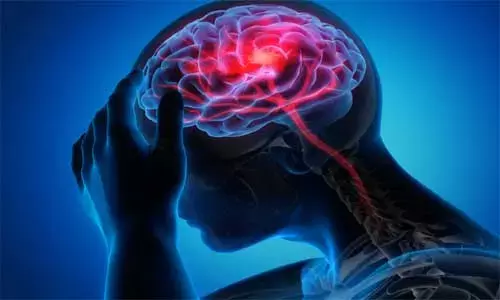- Home
- Medical news & Guidelines
- Anesthesiology
- Cardiology and CTVS
- Critical Care
- Dentistry
- Dermatology
- Diabetes and Endocrinology
- ENT
- Gastroenterology
- Medicine
- Nephrology
- Neurology
- Obstretics-Gynaecology
- Oncology
- Ophthalmology
- Orthopaedics
- Pediatrics-Neonatology
- Psychiatry
- Pulmonology
- Radiology
- Surgery
- Urology
- Laboratory Medicine
- Diet
- Nursing
- Paramedical
- Physiotherapy
- Health news
- Fact Check
- Bone Health Fact Check
- Brain Health Fact Check
- Cancer Related Fact Check
- Child Care Fact Check
- Dental and oral health fact check
- Diabetes and metabolic health fact check
- Diet and Nutrition Fact Check
- Eye and ENT Care Fact Check
- Fitness fact check
- Gut health fact check
- Heart health fact check
- Kidney health fact check
- Medical education fact check
- Men's health fact check
- Respiratory fact check
- Skin and hair care fact check
- Vaccine and Immunization fact check
- Women's health fact check
- AYUSH
- State News
- Andaman and Nicobar Islands
- Andhra Pradesh
- Arunachal Pradesh
- Assam
- Bihar
- Chandigarh
- Chattisgarh
- Dadra and Nagar Haveli
- Daman and Diu
- Delhi
- Goa
- Gujarat
- Haryana
- Himachal Pradesh
- Jammu & Kashmir
- Jharkhand
- Karnataka
- Kerala
- Ladakh
- Lakshadweep
- Madhya Pradesh
- Maharashtra
- Manipur
- Meghalaya
- Mizoram
- Nagaland
- Odisha
- Puducherry
- Punjab
- Rajasthan
- Sikkim
- Tamil Nadu
- Telangana
- Tripura
- Uttar Pradesh
- Uttrakhand
- West Bengal
- Medical Education
- Industry
Tranexamic Acid effective treatment for hemorrhagic stroke if administered early

LOS ANGELES-- Tranexamic acid can prevent death due to bleeding after trauma and post-partum haemorrhage. The researchers aimed to assess whether tranexamic acid reduces haematoma expansion and improves outcome in adults with stroke due to intracerebral haemorrhage.
They conducted a randomized trial STOP-AUST and found that Tranexamic Acid could be a treatment for hemorrhagic stroke, particularly if administered quickly.The findings of research has been presented at the American Stroke Association's International Stroke Conference 2020.
The Spot Sign and Tranexamic Acid on Preventing ICH Growth - Australasia Trial (STOP-AUST) was a multicenter, prospective, randomized, double-blind, placebo-controlled, phase 2 clinical trial using the antifibrinolytic agent tranexamic acid in people with intracerebral hemorrhage (ICH). ICH is a severe form of acute stroke with few treatment options.
Tranexamic acid is currently used to treat or prevent excessive blood loss from trauma, surgery, tooth removal, nosebleeds and heavy menstruation. For this study, one hundred patients with active brain bleeding were given either intravenous tranexamic acid or placebo within 4.5 hours of symptom onset. Researchers analyzed brain CT scans taken during the 24-hour period after treatment with tranexamic acid or placebo.
Researchers found a trend towards reduced hemorrhage expansion in the group treated with tranexamic acid, especially in those treated within 3 hours of the brain bleed. However, this trend was not statistically significant. The finding was consistent with previous research using the medication.
"Further trials using tranexamic acid are ongoing and focusing on ultra-early treatment - within 2 hours. This is where the greatest opportunity for intervention appears to be," said Nawaf Yassi, M.B.B.S., B.Sc., Ph.D., trial investigator and consultant neurologist at the Royal Melbourne Hospital.
"Tranexamic acid is inexpensive, safe and widely available," said Yassi. "Our results and others provide great impetus for further, focused research using this treatment."
Larger trials focused on patient outcomes are required for this therapy to enter routine clinical practice.
For further reference log on to:
https://newsroom.heart.org/news/study-finds-trend-toward-benefit-in-using-blood-clotting-agent-for-bleeding-stroke?preview=0dfbd50d5fd6c095249c6f855b341a8c
Dr Kamal Kant Kohli-MBBS, DTCD- a chest specialist with more than 30 years of practice and a flair for writing clinical articles, Dr Kamal Kant Kohli joined Medical Dialogues as a Chief Editor of Medical News. Besides writing articles, as an editor, he proofreads and verifies all the medical content published on Medical Dialogues including those coming from journals, studies,medical conferences,guidelines etc. Email: drkohli@medicaldialogues.in. Contact no. 011-43720751


